US President Joe Biden warned on Wednesday that he would stop supplying Israel with artillery shells and other weapons if it attacks Rafah in southern Gaza.
"We're not gonna supply the weapons and artillery shells that have been used" in Israel's offensive against Hamas, President Biden said in an interview with CNN.
Mr Biden also also deplored the fact that civilians had been killed by the dropping of US bombs.
"Civilians have been killed in Gaza as a consequence of those bombs and other ways in which they go after population centres," he said.
The comments come after Defense Secretary Lloyd Austin confirmed to a congressional committee that a freeze was placed last week on the shipment of 1,800 2,000-lb (907 kg) bombs and 1,700 500-lb (226 kg) bombs.
"We paused one shipment of high-payload munitions" for Israel but have not "made a final determination on how to proceed with that shipment," Mr Austin said.
State Department spokesman Matthew Miller said the US had "very serious concerns" about Israel's stated plans to go into Rafah, where more than one million Palestinians have taken shelter during the war.
"So we have paused one shipment of near-term assistance and we are reviewing others," Mr Miller said.
But he said that the US still had a "long-term commitment" to Israel's security and pointed to US assistance last month in shooting down drones fired from Iran.
"People should be absolutely clear that we are committed to Israel's security," he said.
Read more: Why the US is stopping some bomb shipments to Israel
But in Rafah, Mr Miller said, "there are so many people crammed into such a small area. "He said that the US was looking "at the way Israel has conducted its operations in the past and what the impact on civilian population has been".
Israeli Prime Minister Benjamin Netanyahu has vowed to go into Rafah as part of the campaign to eliminate Hamas after the militants' attack inside Israel on 7 October.
Israel continued to bombard Rafah today and the military said ground troops conducted "targeted raids" in the southern Gazan city.
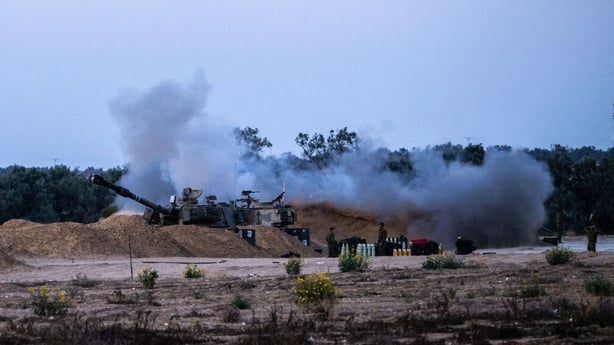
Israel has defied international objections and sent tanks into Rafah, which is crowded with Palestinian civilians sheltering near the Egyptian border, seizing on Tuesday a crossing that is the main conduit for aid into the besieged territory.
The White House condemned the interruption to humanitarian deliveries, with a senior US official later revealing Washington had paused a shipment of bombs last week after Israel failed to address concerns over its long-threatened Rafah operation.
The Israeli military said it was reopening another major aid crossing into Gaza, Kerem Shalom, as well as the Erez crossing, both on the territory's border with Israel.
But the UN agency for Palestinian refugees, UNRWA, said the Kerem Shalom crossing - which Israel shut after a rocket attack killed four soldiers on Sunday - remained closed.
It came after a night of heavy Israeli strikes and shelling across Gaza.
AFPTV footage showed Palestinians scrambling in the dark to pull survivors, bloodied and caked in dust, out from under the rubble of a Rafah building.
"We are living in Rafah in extreme fear and endless anxiety," said Muhanad Ahmad Qishta, 29.
"Places the Israeli army claims to be safe are also being bombed," he told AFP.
In devastated northern Gaza, Al-Ahli hospital said a strike on an apartment in Gaza City killed seven family members and wounded several other people.
The Israeli military said it had struck over 100 targets across the Gaza Strip throughout Tuesday.
It added in a statement that its "troops are conducting targeted raids on the Gazan side of Rafah crossing in the eastern part of Rafah".
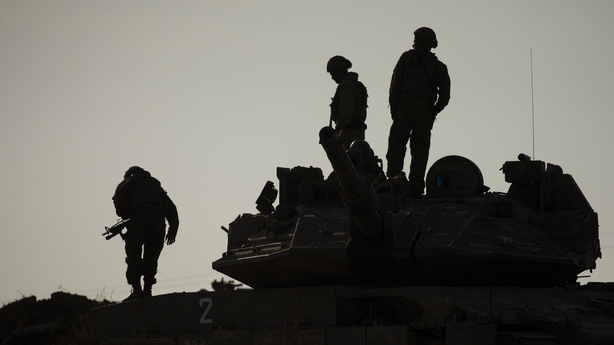
'Catastrophic'
An emergency doctor working in Rafah and nearby Khan Yunis said that with humanitarian access compromised, the health situation was "catastrophic".
"The smell of sewage is rife everywhere," said the doctor, James Smith. "It's been getting worse over the course of the last couple of days."
World Health Organization chief Tedros Adhanom Ghebreyesus said today hospitals in Gaza's south had only "three days of fuel left" because of the border closures.
"Without fuel all humanitarian operations will stop," he posted on X.
Meanwhile, the Hamas-run government media office said health workers had uncovered at least 49 bodies from the premises of Gaza City's Al-Shifa hospital, the territory's largest which was devastated by two weeks of fighting in March.
The bodies were recovered from "a third mass grave" at Al-Shifa, following the discovery of some 30 bodies last month, said Motassem Salah, head of the hospital's emergency department.
There was no immediate comment from Israel, which accuses Hamas militants of operating out of hospitals - a charge denied by the Palestinian group.
The war was sparked by Hamas's unprecedented 7 October attack on Israel, which resulted in the deaths of more than 1,170 people, mostly civilians, according to an AFP tally of Israeli official figures.
Israel in response vowed to crush Hamas and launched a military offensive that has killed at least 34,844 people in Gaza, mostly women and children, according to the Hamas-run territory's health ministry.
Militants also took about 250 hostages. Israel estimates 128 of them remain in Gaza including 36 who officials say are dead.
Talks aimed at agreeing a ceasefire resumed in Cairo today "in the presence of all parties", Egyptian state-linked media reported.
A senior Hamas official said the latest round of negotiations would be "decisive".
Hamas "insists on the rightful demands of its people and will not give up any of our people's rights," the official told AFP on condition of anonymity because he was not authorised to speak publicly on the negotiations.
He had previously warned it would be Israel's "last chance" to free the scores of hostages still in militants' hands.
Incursion condemned
Qatar, which hosts Hamas leaders and has been mediating between the two sides, appealed "for urgent international action to prevent Rafah from being invaded and a crime of genocide being committed".
A Palestinian analyst said Israel's seizure of the Rafah crossing could be an attempt to create new facts on the ground, or a bid to "sabotage the truce talks".
"The takeover is also a symbol shown to the world that Hamas is not in control anymore," said Mkhaimar Abusada, of Al-Azhar University in Gaza.
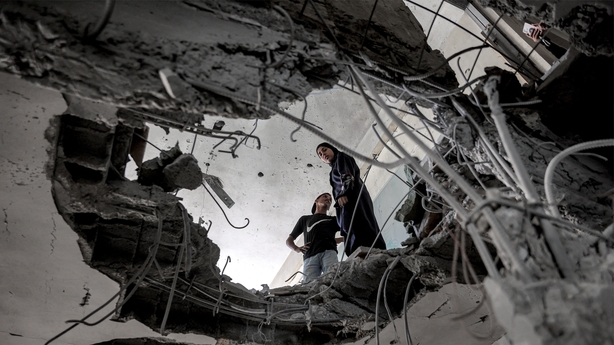
Israel's seizure of the Palestinian side of the Rafah crossing came after Hamas said it had accepted a truce proposal - one Israel said was "far" from what its own negotiators had previously agreed to.
Mr Netanyahu described the Rafah operation as "a very important step" in denying Hamas "a passage that was essential for establishing its reign of terror".
We need your consent to load this rte-player contentWe use rte-player to manage extra content that can set cookies on your device and collect data about your activity. Please review their details and accept them to load the content.Manage Preferences
The Pentagon, meanwhile, said the US military had completed construction of an aid pier off Gaza's coast, but weather conditions meant it was currently unsafe to move it into place.
Defence Minister Yoav Gallant said Israel would "deepen" its Gaza operation if negotiations failed to bring the hostages home.
"This operation will continue until we eliminate Hamas in the Rafah area and the entire Gaza Strip, or until the first hostage returns," he said.
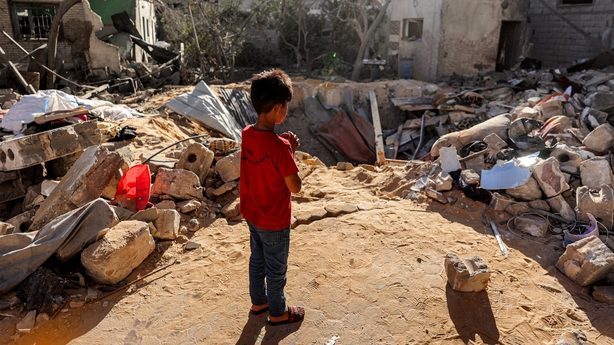
Aid pier completed
The US official said Washington was "especially focused" on the use of the heaviest 907kg bombs "and the impact they could have in dense urban settings".
The Pentagon, meanwhile, said the US military had completed construction of an aid pier off Gaza's coast, but weather conditions meant it was currently unsafe to move it into place.
Israeli defence minister Yoav Gallant said Israel might "deepen" its Gaza operation if negotiations failed to secure the release of the remaining hostages.
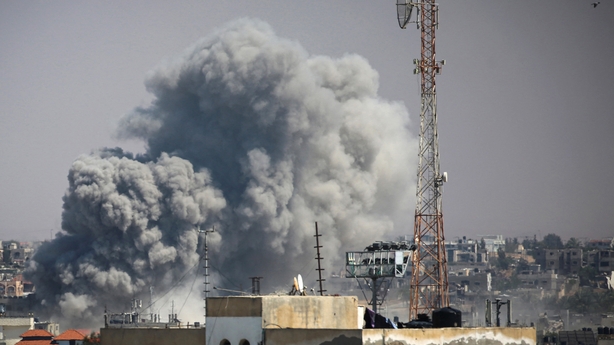
"This operation will continue until we eliminate Hamas in the Rafah area and the entire Gaza Strip, or until the first hostage returns," he said.
Egypt and Qatar have taken the lead in the truce talks, with Hamas saying on Monday it had told officials from both countries of its "approval of their proposal regarding a ceasefire".
Hamas member Khalil al-Hayya told the Qatar-based Al Jazeera news channel the proposal involved a complete Israeli withdrawal from Gaza, the return of displaced Palestinians and a hostage-prisoner exchange, with the goal of a "permanent ceasefire".
Mr Netanyahu's office called the proposal "far from Israel's essential demands," but said the government would still send negotiators to Cairo.

